不定代词专讲
初中英语不定代词讲解及习题
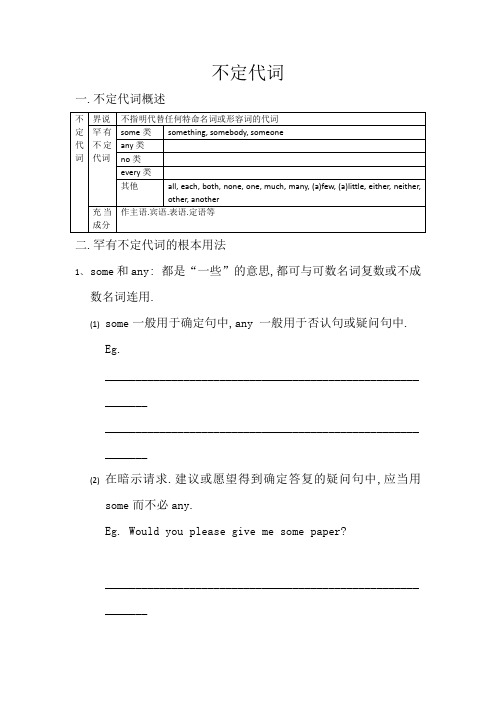
不定代词一.不定代词概述二.罕有不定代词的根本用法1、some和any: 都是“一些”的意思,都可与可数名词复数或不成数名词连用.(1)some一般用于确定句中,any 一般用于否认句或疑问句中.Eg.____________________________________________________ ___________________________________________________________ _______(2)在暗示请求.建议或愿望得到确定答复的疑问句中,应当用some而不必any.Eg. Would you please give me some paper?____________________________________________________ _______(3)当any 暗示“任何”或“无论哪一个”的意义时,可以用于确定句,此时any要重读.Eg. You may come at any time that is convenient to you.___________________________________________________________2、暗示数目的不定代词(1)many______, few_______, a few_______, 用以代替或润饰可数名词.(2)much______, little_______, a little________,用以代替或润饰不成数名词.(3)_______和_______暗示确定意义,_______和_______暗示否认意义.(4)a lot of 和plenty of 等短语既可以润饰可数名词,又可以润饰不成数名词.3.暗示两者和三者的不定代词(1)暗示两者: both, either, neither(2)暗示三者: all, any, none, every(3)暗示确定:both, all(4)暗示否认:none, neither练一练:用以上不定代词填空.我的怙恃都是大夫.__________________________________街道的双方都种了树.There are trees on ______ sides of the street.= There are trees on ______ side of the street.他有两个儿子,都不富有.He has two sons. ______ of them is rich.他有三个儿子,都不富有.He has three sons. ______ of them is rich.三.复合不定代词的用法(1)复合不定代词somebody ,something ,anything,nothing ,everything, everybody等是由some , any ,no ,every, 加上body, thing 组成的,叫做复合不定代词,在句子中当单数应用.(2)somebody, something, someone 一般用于确定句中;anything, anybody,anyone一般用于疑问句和否认句中.(3)假如要在疑问句中暗示请求.建议等确定的意思或者愿望得到确定的答复时,用somebody, someone 或something.(4)润饰复合不定代词的形容词或不定式应放在它们的后面.Eg. He has nothing much to do today.他今天没有若干工作做.Lucy hasn’t anything important to do. 露西没有任何主要时做.四.疑难拓展1.few/a few/little/a little(1)后接名词的不合._______和_______后接可数名词复数,_______和_______后接不成数名词.Eg. There are _______ new words in the text. 课文中有一些新单词.Can you speak _______ English? 你能说一点英语吗?(2)暗示确定意义和否认意义的差别._______和________ 暗示确定,______和_______暗示否认.Eg. I have ________ friends there. I often play with them. There is _______ meat at home. Let’s buy some.2.other/others/the other/another(1)other暗示“另一个”的意思,在句中可作主语.宾语或定语,不自力应用,平日润饰可数名词复数.(2)others可自力应用,无规模限制.(3)other和others前面加定冠词the 时暗示特指,不加the 暗示泛指.The other暗示两个中的另一个,经常应用于句型”one…the other…”,the others 暗示全体其余的人或物.Eg. I have two brothers. ____ is a doctor; ________ is a teacher.He is always ready to help _______.Five of them are in the classroom. What about _______?(4)another(别的一个,又一个),只能代替或润饰单数名词,可用作主语.宾语或定语,不自力应用.前面不加冠词.Eg. Don’t lose heart. Have another try.(5)Another 后可以跟few 或带数字的复数名词.Eg. Just think what our town will be like in another few years.You’d better stay in bed for another two weeks.3、部分否认及完整否认Not与不定代词all, both, every等暗示全体意义的词连用时组成部分否认;若要暗示完整否认,则须要换用none, neither, no 等.练一练:翻译下列句子.4、all, both, each等用作同位语若用作主语同位语,主语可所以名词或代词;若用作宾语等其他成分的同位语,则宾语等成分必须是人称代词,而不克不实时名词.Eg. We all have read it.(all润饰的主语是代词)The village all have been destroyed.(all润饰的主语是名词)They told us all to wait here.(all 润饰的宾语是代词) 5、one 和it 的差别应用(1)it 指代前面的某物.Eg. Where is my pen? I can’t find it.(it 指代前面提到的那支笔)(2)one可以指人,也可以指物.用来代替上文中提到的单数可数名词以及防止反复,其复数情势为ones.Eg. Your pen is so nice. I want to buy one like this.教室练习训练一、单选.1.The two fishermen saw_______ in the sky while they werefishing by a river.A. something strangeB.anything strangeC. strange somethingD. strange anything2. --- Is ____ here? ---No. Bob and Tim have asked for leave.A.anybodyB. somebodyC. everybodyD. nobody3.---Do you want tea or coffee? ---______.I really don't mind4.The old man has two sons .One is a soldier, _______ is a worker.5. There are shops on _____ side of the street.________ of them do not close till 12 at night.A. both; AllB. every; NoneC. either; SomeD. other; Many6. There is not ___ meat in my bowl. There is ____ chicken in it.A. some; anyB. any; someC. any; anyD. some; some7. Could you do___for me, please?A.everythingB. nothingC. somethingD. anything8. Sorry, I can't answer your question. I know____ about the subject.A. a littleB. littleC. fewD. a few9. ---Which would you like, a cup of tea or a glass of milk?----____, thanks. I think I'll just have a glass of water.A. NoneB. NeitherC. BothD. Either10. Tom shook his head and said to us there was _____ in the classroom.A. anybodyB. nobodyC. somebodyD. everybody11. Could I have _____ bottle of apple juice, please?A. anotherB. otherC. some moreD. second12. There are 25 techers in this grade. Eight of them are womenteachers and ______ are men teachers.A. the otherB. the othersC. othersD. other13. They were all tired, but _____of them took a rest.14. ---We have red and yellow T-shirts. Which colour do youlike?--- I’m afraid ____. I think blue will be OK.A. bothB. eitherC. neitherD. none15. ---Can I come this afternoon o tomorrow morning?---_____ is OK. I’m free today and tomorrow.A. EitherB. NeitherC. BothD. None二.按请求完成句子.1. Both Tom and Tim are good at sports.(改为否认句)______ Tom _____ Tim ______ good at sports.2. I can’t speak much English.(同义句转化)I _____ speak_____ English.3. There is something wrong with his eyes.(改为一般疑问句) ______ ______ _______ wrong with his eyes?4. This answer is right. That answer is also right(同义句转化)______ this answer ______ that one are right.5. They haven’t visited the village.She hasn’t visited thevillage either.(连成一句)___________________________________________三.下列句子中各有一处错误,请找出并纠正.1.It is very difficult, and a few people understand it.______________2.Too many work has to be done. ______________3.Why not buy any bread? ______________4.Anyone know how to do it. ______________5.There is not nothing wrong with the radio. ______________家庭功课一、单选.1.The teacher asked the boy many questions, but he only ansewered ______ of them.A.someB. lotsC. eachD. few2. ---I need something for cutting the paper. ---Oh, you want a knife? OK, I’ll get ___ for you.3.Two places of inteerest in Beijing are well known to people from home and abroad. One is the Great Wall, and _____ is the Summer Palace.A. the otherB. anotherC. otherD. others4. ---Would you like _____ to drink? ---Yes. I’d like a cup of coffee.A. something elseB. else somethingC. anything elseD. else anything5. Maybe the disaster can destroy our homes, but ______ can destroy the love in our people.A. somethingB. everythingC. anythingD. nothing二.改错.2. There are many trees on both side of the road. ___________3. He has three sons, but neither of them lives there. ___________4. All of the storybooks is interesting. ___________5. I have important something to tell you. ___________。
不定代词的用法表解

不定代词的用法表解常用不定代词有:some( something,somebody,someone),any( anything,anybody,anyone),(no nothing,nobody,no(one),(every everything,everybody,everyone),all,each,both,much,many, a)little, a)few,other( s),another,none,one,either,(neither等。
一般来讲,修饰不定代词的词要置于其后。
由body,one,thing构成的合成代词:somebody,anybody,everybody,nobodysomeone,anyone,everyone,no(onesomething,anything,everything,nothing作代词的限定词:all,an,other,any,both,each,eitherfew,little,many,much,neither,noneother,some还有不能兼作代词的限定词(形容词)(主要是every,no)。
用法编辑不定代词大部分可以代替名词和形容词,在句中作主语、宾语、表语、定语和状语。
作主语Both(of(them(are(teachers.他们两人都是教师。
做主语时谓语动词用复数作宾语I(know(nothing(about(this(person.我对这个人一无所知。
作表语This(book(is(much(too(difficult(for(a(child.这本书对一个小孩来说太难了。
作定语There(is(a(little(water(in(the(glass.玻璃杯里有一些水。
可以在强调一下a(little,little,a(few,few的区别:a(little通常带有肯定的意思,表示还有一点;而little带有否定的意思,只剩一点儿了。
不定代词讲解
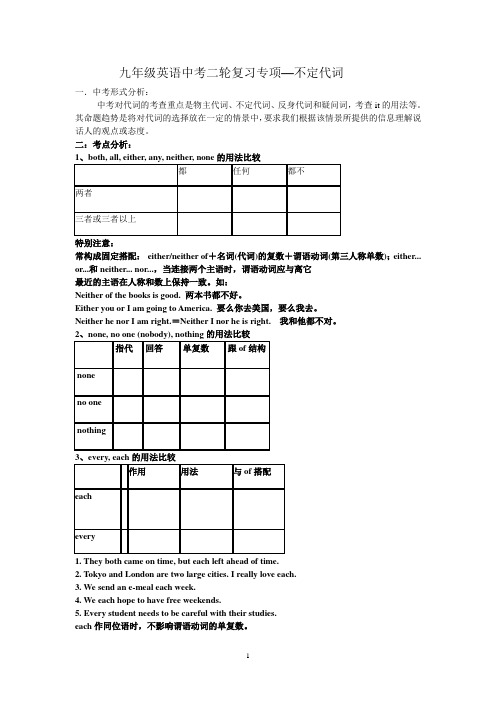
九年级英语中考二轮复习专项—不定代词一.中考形式分析:中考对代词的考查重点是物主代词、不定代词、反身代词和疑问词,考查it的用法等。
其命题趋势是将对代词的选择放在一定的情景中,要求我们根据该情景所提供的信息理解说话人的观点或态度。
二:考点分析:特别注意:常构成固定搭配:either/neither of+名词(代词)的复数+谓语动词(第三人称单数);either... or...和neither... nor...,当连接两个主语时,谓语动词应与离它最近的主语在人称和数上保持一致。
如:Neither of the books is good. 两本书都不好。
Either you or I am going to America. 要么你去美国,要么我去。
Neither he nor I am right.=Neither I nor he is right. 我和他都不对。
1. They both came on time, but each left ahead of time.2. Tokyo and London are two large cities. I really love each.3. We send an e-meal each week.4. We each hope to have free weekends.5. Every student needs to be careful with their studies.each作同位语时,不影响谓语动词的单复数。
4. Some与anysome与any都可以修饰可数名词和不可数名词是表示不定数量的代词,意思是“一些;某些1)一般来讲,some用于肯定句,any用于疑问句、否定句中。
(2)在表建议、请求或希望对方作出肯定回答的疑问句中,用some而不用any。
(3)any可以用于肯定句中,表示“任何一个”,其后可以接单数可数名词或不可数名词。
不定代词的用法ppt课件

Few men know this, do they? 4. 常用词组有 quite a few (好几个),only a few (只有一个),a very few (极少数)。例如: He studied Chinese for quite a few years. 他学汉语已有好几年了。每一个≥3单数
单数
从使用情况来看,闭胸式的使用比较 广泛。 敞开式 盾构之 中有挤 压式盾 构、全 部敞开 式盾构 ,但在 近些年 的城市 地下工 程施工 中已很 少使用 ,在此 不再说 明。
both, either, neither
both为“两者都”,neither为“两者都不”,either为“两者之一”。这 三个单词都用于指两个人或物,在句中可作主语、宾语和定语。 作主语: 1) Both (of them) enjoyed the rice. 他们两人喜欢吃米饭。 2) Neither (of us) is a doctor. 我们俩都不是医生。 3) Either (of you) will go. 随你们哪个去都可以。
neither 表示“也不”的时候,常用在倒装的结构形式中: I don't like to play football. Neither does he. 我不喜欢踢足球,他 也不喜欢。 She hasn't got a bike. Neither have I. 他没自行车,我也没有。
注意,both 和 and, either 和 or, neither 和 nor 可构成连词。表 示“和……两个都”,连接主语时谓语动词是复数;“不是……就是”; “或……或”,“既不……也不”;“……都不” 连接两个并列主语时谓语 动词的数一般应与靠近谓语动词的主语保持一致,如: 1) Both Zhang and Wang are good students. 张、王都是好学生。 2) Either you or he is right. 不是你就是他对的。 3) Neither he nor i am a scientist. 他和我都不是科学家。
【配套K12】[学习]中考英语专题讲练 不定代词(含解析)
![【配套K12】[学习]中考英语专题讲练 不定代词(含解析)](https://img.taocdn.com/s3/m/c4c8f2ad02d276a201292e22.png)
不定代词不定代词知识精讲一、不定代词的定义:不指明代替任何特定名词或形容词的代词叫做不定代词。
不定代词在句中可以作主语、宾语、表语或定语等。
不定代词可以分为一般不定代词和复合不定代词。
二、一般不定代词及用法1. some/any含义:“一些”,既可以修饰可数名词,也可以修饰不可数名词。
区别:1). some用于陈肯句;any用于疑问句或否定句。
例:I can see some flowers, but I can`t see any apples.2). some 用在疑问句中有表示请求或建议的功能;any用在肯定句中有强调或加强语气的功能,意为“任何”。
Would you like some coffee?You may come at any time.2. many/much注意:“many”和“much”前可有so, too等词进行修饰。
如:There are too many mistakes in your diary.So many people are waiting for the bus.Sorry, I’m afraid I can’t go with you. I’ve got too much work to do.3. few/a few/little/a little例:He has a few friends.他有几个朋友。
He has few friends. 他几乎没有朋友。
We still have a little time. 我们还有点时间。
There is little time left. 几乎没剩下什么时间了。
4. both, either, neither, all, every, none5. “other” 、“another”、“others”和“the others”例:I have two pencils. One is yellow, the other is red.I don’t like this gre en pencil, please give me another one.In our class, some students like playing football, others like playing basketball.There are seven people in Running Man. One is a woman, and the others are men.三、复合不定代词及用法1. 复合不定代词的构成:复合不定代词是由some-,any-,no-,every-加上-one,-body,-thing所组成的不定代词。
英语不定代词精讲

英语不定代词精讲(1)英文中主要有这样一些不定代词:every, each, both, all, either, neither, one, none, litter, few, many, much, other, another, some, any, no.另外还有由 some, any, no 和every构成的合成代词,如:somebody, anything, nothing 等。
①both, either和neither这三词都可以用来指两个人或两件事物,但各自的意义都不相同:both 表示“两个都”、either表示“两个中的任何一个”、neither表示“两者都不……”。
它们在句中都分别可以作主语、宾语、和定语,both还可以作同位语,如:Neither of us could help laughing.You may take either of the two books.Both of the books are helpful.两本书都很有益。
Both of the books are not helpful.并非两本书都很有益。
Both用在含not的句中表示部分否定。
Neither可以表示全部否定。
如:Neither of the books are not helpful.②all在谈到三个或三个以上的人或事物时,或是不可数的事物时,我们都可以用all。
它在句中可以充当主语、宾语、定语和同位语、表语,有时还可以作副词用。
如:This is all he knew about it.(作表语)They were all covered with dust.(作副词)All 用在含not 的句子中表示部分否定,none 可以表示全否定。
如:All of the answers are right. 所有的答案都是对的。
All of the answers are not right. 并非所有的答案都是对的。
英语不定代词精讲
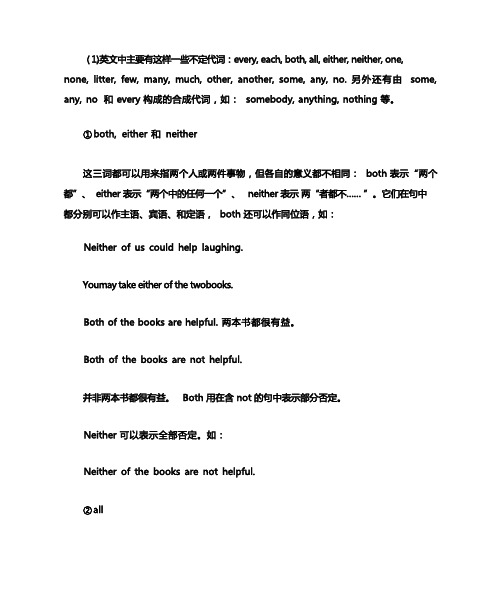
你能在去上学的路上,帮我买几个信封吗?
Willyougivemesomepaper?请给我一点纸。
Somehundredteachershavemovedintonewhouses.约有百位教师搬进新
在谈到三个或三个以上的人或事物时,或是不可数的事物时,我们都可以用all。它在句中可以充当主语、宾语、定语和同位语、表语,有时还可以作副词用。如:
Thisisallheknewaboutit.(作表语)
Theywereallcoveredwithdust.(作副词)
All用在含not的句子中表示部分否定,none可以表示全否定。如:
Idon’tliketheredskirt.Willyoupleaseshowmeanotherone?
Hehadhispapersinonehand,hishatintheother.
Eightofthemaremine,theothersareJohn’s.
Don’tspeakillofothersbehindthem.
Allthechaptersareinteresting.
⑨anyone/anyone;noone/none/nothing
anyone仅指人,anyone既可指人,也可指物。none后跟of短语,既可指人又可指物,而noone只单独使用,又指人。
none作主语,谓语动词用单数,复数都可以,而noone作主语谓语动词只能时单数。如:
another+数词+名词=数词+more+名词,表示再“……”另“外……”。如:
Iwanttobuyanothertwobooks.=Iwanttobuytwomorebooks.
中考英语不定代词语法专题讲练(含答案)
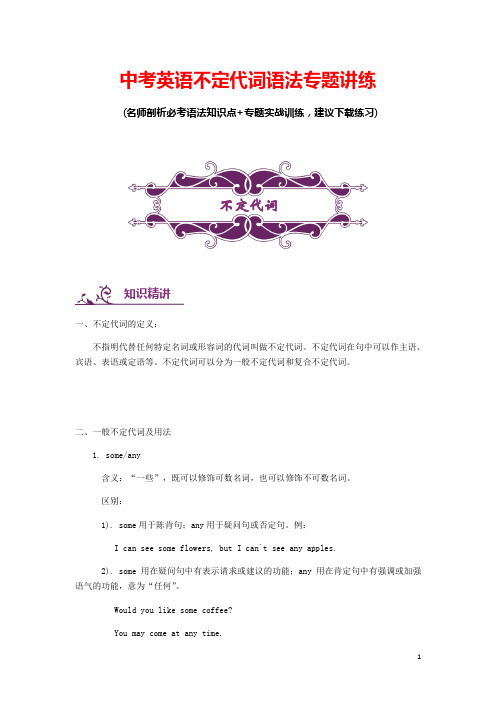
中考英语不定代词语法专题讲练(名师剖析必考语法知识点+专题实战训练,建议下载练习)不定代词知识精讲一、不定代词的定义:不指明代替任何特定名词或形容词的代词叫做不定代词。
不定代词在句中可以作主语、宾语、表语或定语等。
不定代词可以分为一般不定代词和复合不定代词。
二、一般不定代词及用法1. some/any含义:“一些”,既可以修饰可数名词,也可以修饰不可数名词。
区别:1). some用于陈肯句;any用于疑问句或否定句。
例:I can see some flowers, but I can`t see any apples.2). some 用在疑问句中有表示请求或建议的功能;any用在肯定句中有强调或加强语气的功能,意为“任何”。
Would you like some coffee?You may come at any time.2. many/much注意:“many”和“much”前可有so, too等词进行修饰。
如:There are too many mistakes in your diary.So many people are waiting for the bus.Sorry, I’m afraid I can’t go with you. I’ve got too much work to do.3. few/a few/little/a little例:He has a few friends.他有几个朋友。
He has few friends. 他几乎没有朋友。
We still have a little time. 我们还有点时间。
There is little time left. 几乎没剩下什么时间了。
4. both, either, neither, all, every, none5. “other” 、“another”、“others”和“the others”例:I have two pencils. One is yellow, the other is red.I don’t like this green pencil, please give me another one.In our class, some students like playing football, others like playingbasketball.There are seven people in Running Man. One is a woman, and the others are men.三、复合不定代词及用法1. 复合不定代词的构成:复合不定代词是由some-,any-,no-,every-加上-one,-body,-thing所组成的不定代词。
(完整版)不定代词用法讲解
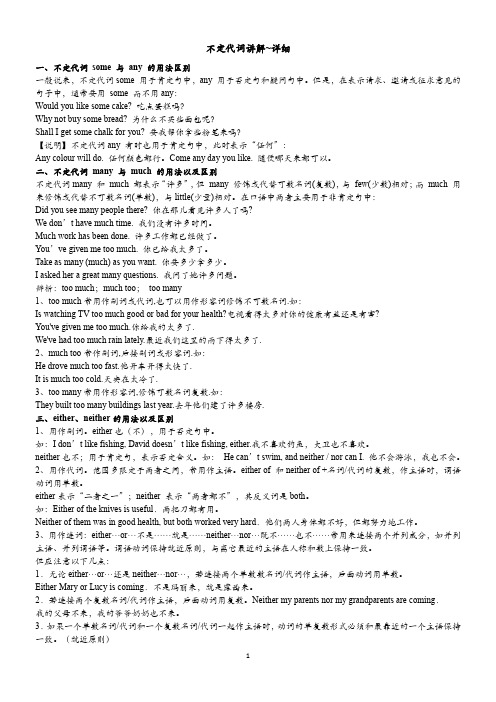
不定代词讲解~详细一、不定代词some 与any 的用法区别一般说来,不定代词some 用于肯定句中,any 用于否定句和疑问句中。
但是,在表示请求、邀请或征求意见的句子中,通常要用some 而不用any:Would you like some cake? 吃点蛋糕吗?Why not buy some bread? 为什么不买些面包呢?Shall I get some chalk for you? 要我帮你拿些粉笔来吗?【说明】不定代词any 有时也用于肯定句中,此时表示“任何”:Any colour will do. 任何颜色都行。
Come any day you like. 随便哪天来都可以。
二、不定代词many 与much 的用法以及区别不定代词many 和much 都表示“许多”,但many 修饰或代替可数名词(复数),与few(少数)相对;而much 用来修饰或代替不可数名词(单数),与little(少量)相对。
在口语中两者主要用于非肯定句中:Did you see many people there? 你在那儿看见许多人了吗?We don’t have much time. 我们没有许多时间。
Much work has been done. 许多工作都已经做了。
You’ve given me too much. 你已给我太多了。
Take as many (much) as you want. 你要多少拿多少。
I asked her a great many questions. 我问了她许多问题。
辨析:too much;much too;too many1、too much常用作副词或代词,也可以用作形容词修饰不可数名词.如:Is watching TV too much good or bad for your health?电视看得太多对你的健康有益还是有害?You've given me too much.你给我的太多了.We've had too much rain lately.最近我们这里的雨下得太多了.2、much too常作副词,后接副词或形容词.如:He drove much too fast.他开车开得太快了.It is much too cold.天实在太冷了.3、too many常用作形容词,修饰可数名词复数.如:They built too many buildings last year.去年他们建了许多楼房.三、either、neither的用法以及区别1、用作副词。
不定代词全部知识点总结

不定代词全部知识点总结一、不定代词的分类1. 不定代词可以分为数量词不定代词和疑问词不定代词两类。
(1)数量词不定代词包括:some, any, no, every, each, all, both, either, neither等。
(2)疑问词不定代词包括:who, whose, whom, what, which, where, when, why, how等。
2. 根据不定代词的用法和意义可以进一步分为实义不定代词和虚义不定代词两类。
(1)实义不定代词用于单数形式表示物体或概念,如:something, someone, somewhere, anybody, anything, etc。
(2)虚义不定代词通常用于复数形式或不可数名词上,表示不确定的概念或情况,例如:none, some, all, none, etc。
二、不定代词的用法1. 用作主语(1)Somebody is knocking at the door.(有人在敲门。
)(2)Anything is better than nothing.(什么都比什么都不强。
)2. 用作宾语(1)I saw someone in the park yesterday.(昨天我在公园看见了一个人。
)(2)Please give me something to eat.(请给我点东西吃。
)3. 用作定语(1)Is there anything wrong with your computer?(你的电脑有问题吗?)(2)There is no one in the room.(房间里没有人。
)4. 用作表语(1)The winner is anyone but him.(赢家是任何人,只要不是他。
)(2)The idea of traveling alone is not for everyone.(独自旅行的想法不适合每个人。
)5. 用作状语(1)I will go anywhere for her.(我会为了她去任何地方。
初中英语中考复习不定代词知识讲解(复合不定代词的应用+常用不定代词的区别)

中考英语不定代词知识讲解一、复合不定代词的分类不定代词是代词中的一个大家族,词如其名,它的性质就是“不定”,所以此类代词不是明确代替任何代词的,通常是指“某XX”。
我们可以按照不同的分类标准来列举不定代词:1.按照构成来进行分类:一类是普通的:one, other, another, either, neither, all, both, many, much, few, little, a few, a little一类是复合的:some-类 someone, somebody, somethingany-类 anyone, anybody, anythingevery类 every, each, everybody, everyone, everythingno-类 no, none, nobody, nothing2.按可数性分类可数:every, each, one, another, either, neither, both, many, few, a few, no one 不可数:much, little, a little可数不可数兼有: no, all, none, some, any, othersome-类复合不定代词和any-类复合不定代词的用法有些类似some和any;1.some-类复合不定代词主要用于肯定句中或预料会得到肯定回答的问句中;any-类复合不定代词主要用于否定句和疑问句中,也可用于肯定句,表示“任何……”之意。
2.some-类复合不定代词和any-类复合不定代词后面加-body或-one时一般指人,加-thing 时一般指物。
3.someone、somebody、anyone、anybody、everyone、everybody、no one 等词后一般不跟 of 短语;需跟of短语通常用some one、any one、every one、none等。
不定代词知识点总结

不定代词知识点总结不定代词是不指明代替任何特定名词或形容词的代词,在英语语法中有着重要的地位。
下面我们将对不定代词的主要知识点进行总结。
一、不定代词的种类不定代词主要包括 some,many,much,little,few,one,ones,no,neither,nor,each,every,all,both,neither…nor…,only 等。
这些词可以表示人、事物或抽象概念,是构成句子中不可缺少的一部分。
二、不定代词的用法1、替代词:不定代词可以替代名词或名词短语,避免重复。
例如:Can you pass me the book? (用 the book代替 the one I mentioned earlier)。
2、修饰词:不定代词可以用来修饰名词或名词短语,表示数量、程度、性质或特征。
例如:I have a few friends here. (表示数量);He is much taller than her. (表示程度);They are some good books. (表示性质)。
3、构成句子成分:不定代词在句子中可以作主语、宾语、表语或定语等。
例如:Each of us has a different opinion. (作主语);I will do what I can to help. (作宾语);This is none of your business. (作表语)。
三、不定代词的特殊用法1、both…and…:表示“两者都”,连接两个并列的主语时,谓语动词要用复数形式。
例如:Both she and I are students.2、neither…nor…:表示“既不……也不……”,连接两个并列的主语时,谓语动词要用单数形式。
例如:Neither he nor she likes music.3、other than:表示“除了”,相当于 but或 except。
通用版中考英语专题讲练: 不定代词(含解析) (4)
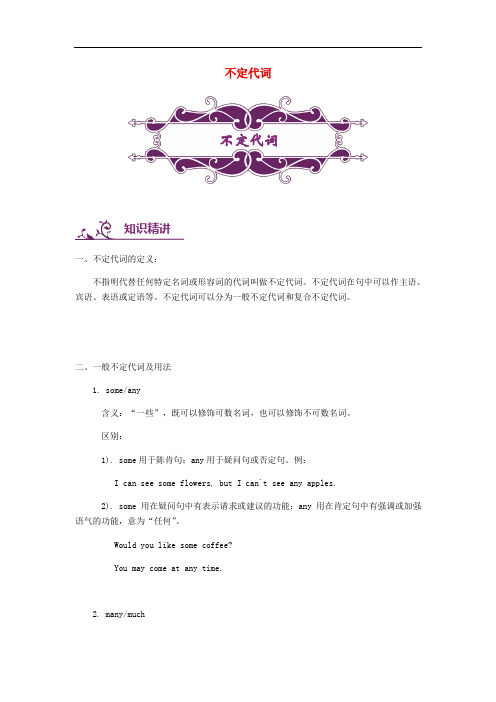
不定代词不定代词知识精讲一、不定代词的定义:不指明代替任何特定名词或形容词的代词叫做不定代词。
不定代词在句中可以作主语、宾语、表语或定语等。
不定代词可以分为一般不定代词和复合不定代词。
二、一般不定代词及用法1. some/any含义:“一些”,既可以修饰可数名词,也可以修饰不可数名词。
区别:1). some用于陈肯句;any用于疑问句或否定句。
例:I can see some flowers, but I can`t see any apples.2). some 用在疑问句中有表示请求或建议的功能;any用在肯定句中有强调或加强语气的功能,意为“任何”。
Would you like some coffee?You may come at any time.2. many/much注意:“many”和“much”前可有so, too等词进行修饰。
如:There are too many mistakes in your diary.So many people are waiting for the bus.Sorry, I’m afraid I can’t go with you. I’ve got too much work to do.3. few/a few/little/a little例:He has a few friends.他有几个朋友。
He has few friends. 他几乎没有朋友。
We still have a little time. 我们还有点时间。
There is little time left. 几乎没剩下什么时间了。
4. both, either, neither, all, every, none5. “other” 、“another”、“others”和“the others”例:I have two pencils. One is yellow, the other is red.I don’t like this gre en pencil, please give me another one.In our class, some students like playing football, others like playing basketball.There are seven people in Running Man. One is a woman, and the others are men.三、复合不定代词及用法1. 复合不定代词的构成:复合不定代词是由some-,any-,no-,every-加上-one,-body,-thing所组成的不定代词。
中考英语专题讲练 不定代词(含解析)

不定代词不定代词知识精讲一、不定代词的定义:不指明代替任何特定名词或形容词的代词叫做不定代词。
不定代词在句中可以作主语、宾语、表语或定语等。
不定代词可以分为一般不定代词和复合不定代词。
二、一般不定代词及用法1. some/any含义:“一些”,既可以修饰可数名词,也可以修饰不可数名词。
区别:1). some用于陈肯句;any用于疑问句或否定句。
例:I can see some flowers, but I can`t see any apples.2). some 用在疑问句中有表示请求或建议的功能;any用在肯定句中有强调或加强语气的功能,意为“任何”。
Would you like some coffee?You may come at any time.2. many/much注意:“many”和“much”前可有so, too等词进行修饰。
如:There are too many mistakes in your diary.So many people are waiting for the bus.Sorry, I’m afraid I can’t go with you. I’ve got too much work to do.3. few/a few/little/a little例:He has a few friends.他有几个朋友。
He has few friends. 他几乎没有朋友。
We still have a little time. 我们还有点时间。
There is little time left. 几乎没剩下什么时间了。
4. both, either, neither, all, every, none5. “other” 、“another”、“others”和“the others”例:I have two pencils. One is yellow, the other is red.I don’t like this gre en pencil, please give me another one.In our class, some students like playing football, others like playing basketball.There are seven people in Running Man. One is a woman, and the others are men.三、复合不定代词及用法1. 复合不定代词的构成:复合不定代词是由some-,any-,no-,every-加上-one,-body,-thing所组成的不定代词。
不定代词用法精讲精练
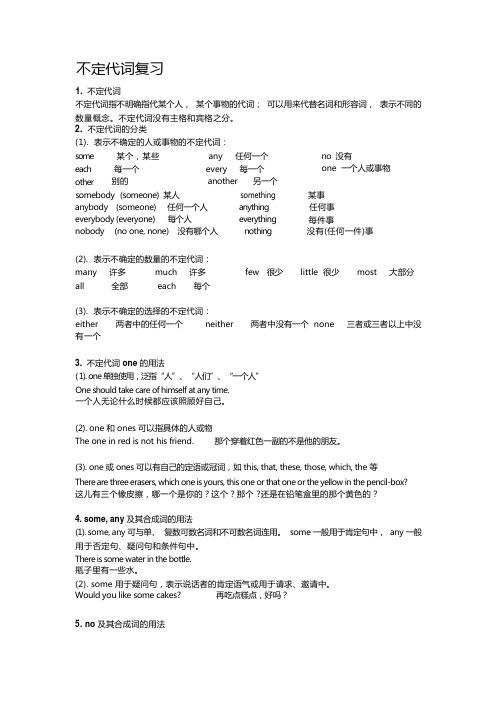
5. no 及其合成词的用法不定代词复习1. 不定代词不定代词指不明确指代某个人, 某个事物的代词; 可以用来代替名词和形容词, 表示不同的 数量概念。
不定代词没有主格和宾格之分。
2. 不定代词的分类(1). 表示不确定的人或事物的不定代词:any 任何一个 every 每一个 another 另一个somebody (someone) 某人 anybody (someone) 任何一个人 everybody (everyone) 每个人 nobody (no one, none) 没有哪个人somethinganythingeverythingnothing no 没有 one 一个人或事物 某事 任何事 每件事 没有(任何一件)事(2). 表示不确定的数量的不定代词: many 许多 much 许多 few 很少 little 很少 most 大部分 all 全部 each 每个(3). 表示不确定的选择的不定代词:either 两者中的任何一个 neither 两者中没有一个 none 三者或三者以上中没 有一个3. 不定代词 one 的用法( 1). one 单独使用,泛指“人”、“人们”、“一个人”One should take care of himself at any time.一个人无论什么时候都应该照顾好自己。
(2). one 和 ones 可以指具体的人或物The one in red is not his friend. 那个穿着红色一副的不是他的朋友。
(3). one 或 ones 可以有自己的定语或冠词,如 this, that, these, those, which, the 等There are three erasers, which one is yours, this one or that one or the yellow in the pencil-box? 这儿有三个橡皮擦,哪一个是你的?这个?那个 ?还是在铅笔盒里的那个黄色的?4. some, any 及其合成词的用法(1). some, any 可与单、 复数可数名词和不可数名词连用。
- 1、下载文档前请自行甄别文档内容的完整性,平台不提供额外的编辑、内容补充、找答案等附加服务。
- 2、"仅部分预览"的文档,不可在线预览部分如存在完整性等问题,可反馈申请退款(可完整预览的文档不适用该条件!)。
- 3、如文档侵犯您的权益,请联系客服反馈,我们会尽快为您处理(人工客服工作时间:9:00-18:30)。
不定代词不定代词:即不指明代替任何特定名词或形容词的代词(一)one的用法1. One 表示泛指的人,表示“人人”或“一个人”所有格形式:one’s 反身代词:oneself 复数形式:onesEg: One should be strict with oneself. ( be strict in sth)人人要严格要求自己2. One/ones 代替上文中提到的可数名词,以避免重复。
Eg: I haven’t a pen. Can you lend me one?He doesn’t like red shirts; He likes white ones.3. One 可以用the, this, that, either, another, which, 形容词修饰注意:one 前面不能直接加数词Eg: which pen is yours, this one or that one?I have a new pen and several old ones.注意点:1. One 与a/an的区别A/ an ---只用于单数可数名词前,表示“一”。
但数量意义比较弱,常不翻译。
One---表示“一”,“一个”。
数量意义比较强。
Eg: I have a pen./ I have one pen but he has two pens.2. One与it的区别均用于指代前面提到过的名词One ---用于指代前面提到过的同名异物It--- 用于指代前面提到过的同名同物Eg: I threw the ball to him and he caught it.I have lost mu umbrella, I think I must buy a newone.3. One/ones 与this, that, these, those 的区别One/ ones 表示泛指---其前有修饰语,其后一般不加介词短语做修饰表示特指---其后一般加介词短语做修饰That/ this/.those/ these 其后一般加介词短语做修饰Eg: The photo of you is much better than that in your album.I want a photo of you. Would you give me one?My shoes are similar to the ones /those you had on yesterday.4. 代替前面出现的不可数n.。
只能用thatEg: The weather inShanghai is hotter than that in Beijing.(二) some 与any1.some 多用于肯定句用于疑问句,表示请求、建议、劝告、期望得到肯定回答Eg: There is some milk in the bottle.Could I ask you some questions? (请求)Would you like some coffee?The apples are nice, won’t you have some? (建议)2.any 多用于否定、疑问和条件句(注意否定词never, without, hardly)用于肯定句,表示“任何,任何的”Eg: She left without telling any of us.Are there any letters for me?Come and see me if you have any time.注意:something, anything; someone, somebody; anyone, anyboday; 与some, any用法类似。
(三)few, a few, little, a little1.few (很少,不多), a few (几个,一些)修饰可数名词little, a little 修饰不可数名词2. few, little表示否定a few, a little 表示肯定Eg: There is still a little water in the bottle. You may drink it.I want to say a few words at the meeting.Hurry up! We’ve few minutes/ little time left.注意:1)only,quite不能直接用于few, little之前,very 可以Eg:only/quite a few pupils 许多学生very little money2)little, few, many, much前只能用so3)quite a few = manyquite a little = much(四)几对易混的不定代词两者三者(或以上)都both all任何一个either any任何一个都不neither none另一个the other another每一个each every1. both与all (都)1)both“两者”all “三者及以上”2)both, all 做主语均用谓语复数3)both, all的结构both, all of +人称代词宾格of +限定词+ 名词复数+限定词+ 名词复数限定词a/an/ the名词所有格指示代词(this,that,these/those)形容词性物主代词4)both, all 做同位语时,要放在be动词,情态动词,助动词后面行为动词前面Eg: Both the children are good at maths.All the books are interesting.We all came by plane.2. Neither, none “都不”1)neither “两者都不”;none “三者及以上都不”2)neither, none做主语均用单数3)neither, none of + 限定词+名词复数(此时Neither, none均为代词)Neither 可做形容词,修饰单数名词Eg:Neither of the answers is correct.None of these books is interesting.Neither room is big enough for us.3. Either, any “任何一个”1) either“两者中任何一个”, any “三者及以上任何一个”2)either, any 做主语均做单数3)either 可做代词和形容词,可接either of 结构Eg: Either shirt fits me well.You can take any (one) of these.either of the two.4. Every,each “每一个”1)each, every 均可以表示“三者以上的每一个”但是表示两者,只能用“each”2)each 能做adj./ pron.,可以接each of 结构every 只能做adj., 不能接of 结构,但可以用“every one of ”结构3)every可用于every +基数词+ 名词复数“每.....”every + other + 单数名词“每隔.....”Eg: Each of her parents has a bike.There is a chair in every (each) corner of the room.Each of them/ Every one of them has a room.Every five days 每隔四天(每五天)Every other day = every two days 每隔一天5. the other, anotherthe other “两者中的另一个”pronadj. +单数名词/ oneanother “三者及以上中的另一个”pronadj. +单数名词/ one+数词+名词复数Eg:I have a book in one hand and a pen in the other (hand).I don’t like this dress. Show me another (one).I need another few days before I finish the work.There are other ways of doing it.There are forty students in our class. Thirty are boys and the others are girls.They walked out of the hall one after another.The policemen saved one child after another.Give her some others ,please.Now close your other eye.常用搭配:One…..another….the other/ the third 一个…..另一个….第三个Some….. others…… still others 一些,一些,另外一些One another/ each other相互(help/ learn from each other相互学习,相互帮助)One after another 一个接一个Some others 另外一些注意点:1. Mary is the tallest in her class.(保持愿意)= Mary is taller than any other student in her class.all the other studentsanyone elsethe other students/ the others2. both/ all/ either/ neither/ none/ some/ each of其中some/ both/ all + 谓语动词复数;其余用谓语动词单数3. not only.....but also; either...or; neither...or; there be; here be 就近一致原则4. both...and 谓语动词用复数(五)其它不定代词1. someone (somebody)某人;anyone (anybody) 任何人;everyone(everybody) 每个人,人人;none (nobody)some one; any one; every one; no one规律:1) 连一起的不可接of, none 除外(someone (somebody); anyone (anybody); everyone(everybody) 不可接of) (none 后可接of )2) 分开的可以接of, no one 除外(some one; any one; every one )可接ofno one 不可以接of3) 连在一起的只表示人,none 除外(none 即表示人,又表示物)4) 分开始即表示人又表示物,no one除外(no one只表示人)2. Anything (任何事),something (某事),everything (一切),nothing (没什么)nothing ---表示什么也没有none --- 表示所指的东西没有Eg: 1) Is there anything in the bottle? No, there is nothing.2) Is there any water in the bottle? No, there is none.注意:不定代词+ else的所有格---- 不定代词+ else’sEg: Her voice is sweeter than anyone else’s in her class.3. “也”的表示So, neither 均用于句首,so 表示肯定;neither表示否定Too, either 均用于句末,要用“,”隔开,too表示肯定,either表示否定。
